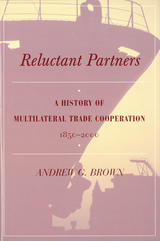
This is a nontechnical book for those curious about the possibilities for cooperation among states and should be of interest to both the nonspecialist and the specialist. It draws on more than one discipline to interpret the events, lying in the triangle bounded by political science, economics, and history.
Andrew G. Brown is a former Director of the General Analysis and Policies Division for the United Nations, New York.

Constitutional principles at the core of the United States government divide authority between market and state and within the structure of the state itself. This diffusion of authority is valuable because it defends against the excesses of national government, causing federal policy initiatives to be more attuned to the concerns of local jurisdictions, and creating a context in which free enterprise may flourish.
However, this diffusion of authority weakens the control that federal officials enjoy over resources vital to the implementation of national policy. To implement their plans, federal policy formulators must often call upon autonomous participants such as state or local governments, advocacy groups, or commercial interests. When federal policy challenges the perspectives, interest, or priorities of these participants, they become reluctant partners. These implementation participants enjoy substantial autonomy, making their cooperation in pursuit of federal policy goals uncertain and difficult to achieve. How, then, can the federal government secure the cooperation it needs to implement policy when the act of implementation empowers potential adversaries?
Reluctant Partners explores these problems and proposes strategies to reduce the impediments to cooperation and promote policy coordination. Drawing upon theories of regime development and cooperation, Stoker suggests the “implementation regime framework” to analyze the difficulties of realizing cooperation in the implementation process. The framework is illustrated with numerous vignettes and two extensive case studies: the National School Lunch Program and federal nuclear waste disposal policy.
READERS
Browse our collection.
PUBLISHERS
See BiblioVault's publisher services.
STUDENT SERVICES
Files for college accessibility offices.
UChicago Accessibility Resources
home | accessibility | search | about | contact us
BiblioVault ® 2001 - 2024
The University of Chicago Press









